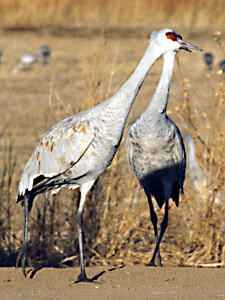
Sandhill Cranes
Grus canadensis
I have a BIG family. There are more of us (approximately 650,000) than any of the other cranes. We have thrived in North American (map of our range) for millions of years. Seriously. Millions. We know this because a human found a ten-million-year-old Miocene crane fossil in Nebraska that is structurally identical to me. That makes my family the oldest known bird species still surviving. Take that, Gymnogyps! I imagine that's why our feathers are so gray. We've been here a long time!
We ARE cranes, so we follow the basic drill. We're mostly monogamous, aren't picky eaters, have bald spots on our heads, and like to sing to our partners.
We Like to Eat in Fields
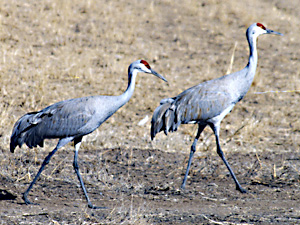
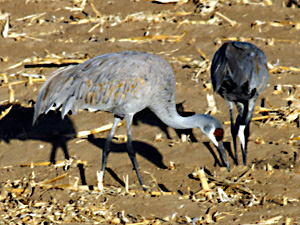
As I said, we aren't finicky eaters, but we do like to eat. Frequently, we forage in fields. Admittedly, this sometimes upsets farmers who fear my boisterous siblings will damage their crops. There's always someone whose antics wreck things for everyone else! In fact, however, human research has comfirmed something the Grus family has known all along. Our foraging actually aerates and fertilizes the soil. Fortunately for us, the humans at the International Crane Foundation have been perfecting some techniques for protecting crops, while still allowing us to scrounge and improve the soil in the fields that are so important for our prosperity. Clever humans!
We Are Very Gregarious
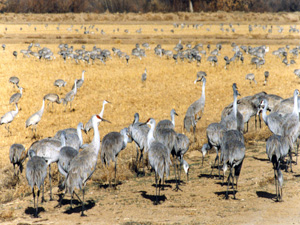
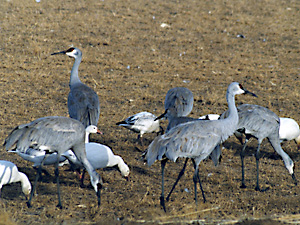
We may forage alone or in small groups (a group of cranes is called a sedge) during the day, but during the winter we like to hang out together at night. And come spring, we hold a HUGE family reunion in the Platte River Basin in Nebraska. Over 3/4 of all the Sandhills in the world meet there to prepare for our migration to the summer breeding grounds. That's nearly half a million of us. And when we are gathered, we do the things we do best. . .
We Sing and Dance
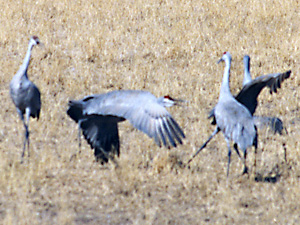
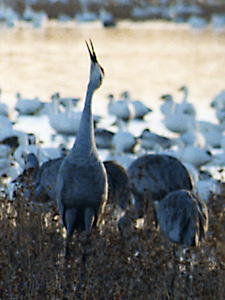
I know this sounds arrogant, but it's true nevertheless. When it comes to music, my family rocks! Even a solo performance can be heard for miles, but we specialize in songs you humans have named unison calls. These are complex, coordinated songs that retune the evening sky. When we sing, we stand upright with our beaks pointed skyward. We also are famous for our dancing. We love dancing so much, we'll do it even when none of us are singing. Just like in humans, our musical performances help us find mates. And once we've found that special someone, the coordinated singing and dancing strengthens the bond. Music also helps us unwind and avoid aggression.
More Sandhill Crane Info
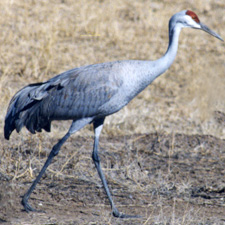
- Our nests are low mounds of local vegetation, usually in wetlands.
- We usually lay two eggs. Our chicks first fly 67-75 days after hatching.
- Just like humans, some of us also cover our gray. We do it by smearing red mud in our feathers while we preen. We get the mud during the spring and summer while we poke around in the dirt to find tubers and grubs (yum!). It fades just like human dyes, however, and by winter most of us are back to our natural gray.
- Most of us live in North America, but some of our more adventurous siblings live as far west as Siberia and as far south as Mexico and Cuba.
- We reach maturity at 3-5 years and can live 25 years in the wild.
Want to Know More?